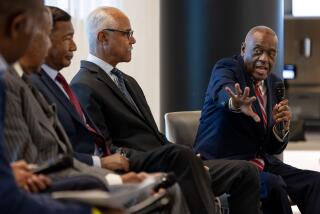The Eight Lives of a Serial Serviceman and His Army-Navy Shell Game : Military: For more than 12 years until he was court-martialed, a chameleon-like loner enlisted over and over using multiple aliases.
- Share via
First there was Walter Banks Beacham Jr., and it was his real name.
Then came Mark Richard Gerardi, the first of many aliases, followed by Cedrick Houston and Chris Villanueva and Zachary Pitt and George Perez.
Four times he served in the Navy.
Four times he served in the Army.
And then he was court-martialed.
For more than a dozen years, he managed to foil recruiters by using fictitious names and fictitious credentials. And after serving just long enough to receive his signing bonus, he would hop a fence or hail a taxi and then slip unnoticed back into civilian life.
“Look at the things I’ve seen and done,” he said the other day. “My life is a facade.”
But perhaps his greatest accomplishment was beating the largest and most complex organization in the United States: the military.
And he did it at a time when the armed forces have been letting fewer people in, the Pentagon is downsizing and closing bases, and the Army and Navy have offered early retirements and buyouts in order to get people out.
“It’s amazing. I’m intrigued. I’m appalled,” said Kathleen M. Gilberd, a paralegal counselor who specializes in military administrative matters in San Diego, where Beacham went through several of his Navy boot camps.
“Eight is a hell of a lot of enlistments, and I’m a little puzzled because you’d think the background checks would catch him.”
Robert Bowers, a Fairfield, Calif., attorney who as an Army captain prosecuted Beacham at Ft. Ord, said that in the 500 courts-martial he has handled, nothing compares in scope to the revolving-door antics of Navy Petty Officer-turned-Army Pvt. Walter Banks Beacham Jr.
“He knew the system, he knew the right codes,” Bowers said. “And that’s all stuff that even most prosecutors and lawyers don’t know.
“And you have to consider that recruiters have certain quotas they have to make, and recruiting is difficult right now with the drawdown. There may be some oversight by recruiters who look the other way.”
With phony birth certificates, fake driver’s licenses and fraudulent Social Security cards, Beacham enlisted over and over again under multiple aliases. It was a pattern that turned his life into a double-entendre.
The product of a mixed marriage, he can easily pass as either white, African American, Cuban or Puerto Rican. He said he was raised in and out of juvenile halls in Chicago and California. He took the nickname “Sonny,” and on his left shoulder is etched a tattoo of battling good and bad angels. “It reminds me I’m in conflict with myself,” he said.
Today, at age 34, he lives in a $160-a-month room near Los Angeles City College, works as a private security guard but is still so restless that during an interview in a downtown office building he could not resist the urge to deceive others. After excusing himself to use the men’s room, he returned with the distinct smell of cigarette smoke on his breath.
“I guess I can only take it back to my childhood,” he said. “I had the features of a white kid but the attitude of a black kid. I could pass for anything. I could be an innocent, cute, little kid or a troublemaker. I took chances and I got away with it.
“And I observe things. I keep my eyes open. I see stuff. And I never want to be lost. I look for shortcuts. I see life differently. Basically it’s just like I’m seeing for myself that I’m a loner. I like to take chances, and by being a loner, you’re the leader of your gang because you’re the only one in it.”
His mother also tried to explain her son’s psyche, recalling how he was made a ward of the state when he was 9 years old because “I couldn’t control his behavior.”
“They said he had a double personality, and he was almost diagnosed schizophrenic,” said Mary Ann Beacham of Oakland. “Sometimes he would act one way and sometimes another.
“He needs to get his life together,” she added.
Reassembling his life is now Beacham’s greatest challenge. In the past, he joined the service for signing bonuses of up $4,000, for trips to exotic ports in Asia and Europe, and for his greatest love--the chance to live someone else’s life.
According to military records and Beacham’s own recollections, he first joined the Navy in 1980 in Oakland. He had stopped in at a recruiting station at a local mini-mall, full of patriotic zeal to “defend my country and do the good thing.”
“I had a big Afro,” he said. “It was out there. It looked like I was in one of those Snoop Doggy Dogg videos.”
He said the recruiter later came to his home. “There were about eight of my friends and we were all sitting around and smoking and drinking and he recruited us all,” Beacham said.
His Navy days ended in six weeks.
During boot camp at a San Diego training center, Beacham felt uncomfortable in what he called the “white man’s Navy.” After seven brief AWOL incidents, he left for good. “I put away my uniform, I got my money, I took a cab out of the front gate and then a Greyhound to L.A.”
Six months later, he joined the Army. He added the “Jr.” to his name. And when recruiting officials inquired, he answered “no” to every question--no problems at school, no problems with police, no prior enlistments.
“Do you do drugs? Answer no,” Beacham said. “Are you a homosexual? No. Have you been in the service before? No.”
He was a soldier for six months when he was discharged after the Army got wise and realized his Social Security number matched that of the Beacham who’d been in the Navy. So he returned to Oakland, and within three months re-entered the Navy--incredibly again using his real name.
“I would have made it through but five weeks into it, they found drugs in my urine and one of the company commanders was still there from the time before and he saw my name on a list,” Beacham said. “I went AWOL.”
His fourth enlistment was in the Army Reserve in 1984. He took the name of a high school friend, borrowed his diploma and his birth certificate and other identification records, and joined up as Mark Richard Gerardi.
He completed boot camp at Ft. Dix, N.J., was attached to a San Francisco unit and toured South Korea for three weeks. And then?
“I got this one female pregnant and I left her,” he said. “She got pissed and was going to turn me in. So I had to be cool. I worked my job for a bit. But then I walked away and never heard again from them. I guess they just cut you loose after awhile. I don’t know.”
In 1986, Cedrick L. Houston joined the Navy.
“I got that name from a guy I met who was trying to be a dancer in Hollywood,” Beacham said. “He was a struggling dancer or actor or something. I told him I could get him a job if I could use his credentials.”
He finished basic training and then was sent to submarine school on the East Coast. “But I called some white guy a cracker and they all went crazy. I was selling doughnuts on the base there until classes started and I called this sailor a silly-ass cracker. And they put me out of the Navy for that.”
No. 6 was in 1987, when he joined the Army in Glendale. The name this time was Chris Villanueva. ID taken from an out-of-work truck driver he met in the San Fernando Valley. Boot camp in Ft. Sill, Okla. Then posted to Germany.
While there, he was interrogated about a large amount of cocaine found in some duffel bags. Fearing arrest, he snuck away, he said, eventually returning to California.
No. 7. 1989. The Navy. Zachary Pitt. “I met him in the Bay Area. I don’t even remember if he was white or Mexican,” Beacham said.
He went to San Diego and worked as a mess management specialist. “I was a cook,” he said. He walked out shortly before his ship was to leave for Japan.
No. 8. 1992. The final enlistment. The Army. George Perez. Boot camp at Ft. Bliss, Tex. Advanced training at Ft. Sill. Assigned as a forward observer in a field artillery unit.
“Something happened. I couldn’t stick around. Time was choking up on me. I was in trouble for staying out late, and I was afraid I’d be busted right then. I left before I got my bonus.”
But like time, luck also was running out. He was arrested by police in December, 1992, after an argument with a Los Angeles bus driver. Turned over to military authorities, he was court-martialed at Ft. Ord on multiple charges of unlawful enlistment, being AWOL and desertion, as well as the old drug case in Germany. He served eight months and 25 days in an Army prison at Ft. Lewis, Wash. He was dishonorably discharged.
At his court-martial, he stood before the Army judge and pleaded guilty, and he tried to explain who Walter Banks Beacham Jr. is. “I have had a lot of problems in the past,” he said. “A long time ago, these problems arose when I was merely trying to serve my country.”
Then he added, as if in understatement: “I know that it is difficult to see the real me.”
More to Read
Sign up for Essential California
The most important California stories and recommendations in your inbox every morning.
You may occasionally receive promotional content from the Los Angeles Times.











